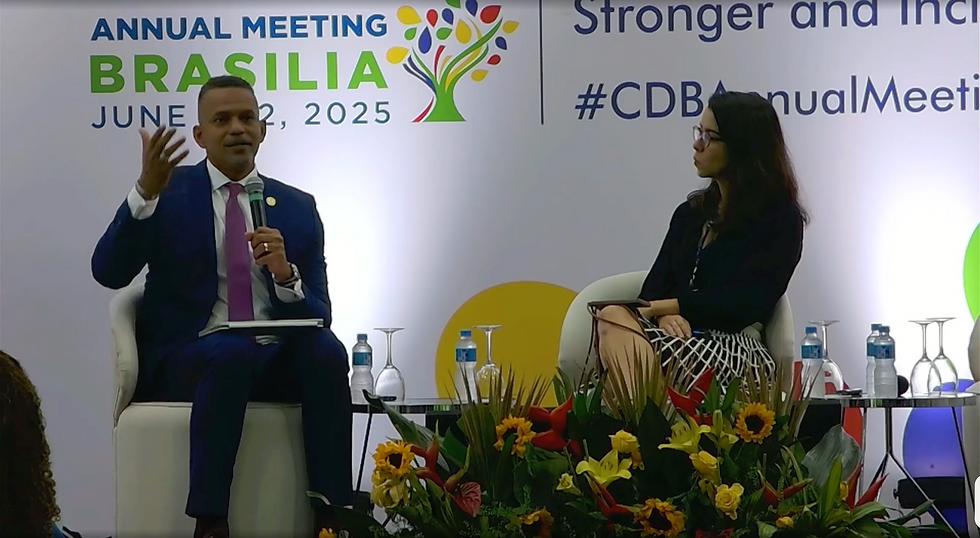The Audacity to Hope: Caribbean Development Bank President Discusses Pre-Cop30 Strategy
- Jun 17, 2025
- 4 min read
Last week, the governors of Caribbean central banks and other leaders from across the region convened in Brazil for the Caribbean Development Bank’s 55th Annual Meeting. On the agenda was a Pre-COP30 session discussing the importance of sustainable finance in addressing the region’s mounting challenges. Challenges such as our vulnerability to external global shocks, poor economic diversification, and the environmental impacts of climate change are far from new. Over the past three decades since COP1 in 1995, little has changed except to underscore the rising stakes of our inaction on the climate crisis. In his opening statement, CDB President Daniel Best apologised for what he perceived as an impassioned appeal regarding the existential nature of the climate crisis. As a young Caribbean native, his passion is understandable, excusable, and encouraged, given that it is our leaders’ responsibility to represent our interests on the global stage. In this pre-COP session, rather than succumbing to hopelessness in the face of what may seem like a lack of progress, the President’s remarks advocated for the Caribbean to persist, within a flawed system, in striving for justice, survival, and meaningful climate action.
Here are my takeaways as a young climate justice advocate from the President’s pre-Cop remarks:

1. Reforming Access to Multilateral Financing
To understand the CDB President’s call for increased multilateralism, it is important to define multilateral financing. This refers to funds disbursed by multilateral development banks (MDBs)—such as the IMF, World Bank, and the Caribbean Development Bank. These institutions are backed by multiple member states to support development initiatives including infrastructure, education, and climate adaptation.
President Best emphasised that stronger intergovernmental cooperation is essential, particularly for small states. While he acknowledged new climate funds like the Loss and Damage Fund, he questioned the value of creating new mechanisms when existing funds remain underutilised.
The challenge is not only the availability of financing but its accessibility. Many developing countries and Small Island Developing States (SIDS) face difficulties meeting the stringent documentation, reporting, and compliance requirements necessary for approval. These bureaucratic barriers often exclude those who need support most.
This persistent issue highlights a critical flaw: the systems intended to assist often inadvertently marginalise vulnerable states. Until accessibility is meaningfully improved, multilateral financing will fall short of its potential, especially for regions most vulnerable to the climate crisis.
This leads to the second key takeaway:

2. By Whose Rules? Procedural Justice on the Global Stage
The President didn’t use the term “procedural justice,” but the concept was present throughout his remarks. Procedural justice concerns the fairness and legitimacy of decision-making processes, especially when those decisions profoundly affect marginalised communities. It requires that all parties impacted by decisions have meaningful participation, that processes respect human dignity, apply consistent and transparent rules, and inspire trust in decision-makers. This concept, rooted in political philosophy and legal theory, reminds us that justice is as much about “how” decisions are made as “what” is decided.
Though the CDB President didn’t explicitly name procedural justice, his remarks echoed its core principles. Despite his critique of global climate negotiations, he insisted that countries in the Caribbean region must attend and engage. Absence is not neutral; it signals acquiescence to a flawed system that silences vulnerable voices.
Procedural justice goes beyond funding access—it demands amplifying SIDS’ voices, reducing the sway of powerful polluters, and holding developed nations accountable for their historical and present contributions to climate harm. The President’s call is clear: to opt out is to relinquish power to those who consistently neglect our survival.
3. Beyond These High Walls: Accountability in Development
Finally, one of the most powerful moments of the speech came as the President reflected on the development industry itself.
He noted, with a touch of humour, that development professionals often gather in elite settings to debate nuanced theories of development, frequently using technical language that is disconnected from the realities they are supposed to address. This insular space is self-congratulatory, comfortable, and far too often inaccessible to the very communities it aims to serve.
He reminded the attendees of the pre-COP session that often the only thing separating the experts in the room, from the people they represent is the gate of the hotel, or the walls of the conference room. He emphasises that with the livelihoods of millions of Caribbean people at risk, our leaders must do more to centre their needs and experiences at the forefront of decision-making.

It is with this sacred mandate in mind that the Caribbean Development Bank finds itself uniquely positioned to meet the challenge of climate adaptation. It has the infrastructure, regional insight, and multilateral support necessary to channel concessional financing from the global stage directly into Caribbean communities. The Bank has committed to scaling up climate finance through its Special Development Fund, with 35% of funds already earmarked for climate initiatives and a target to raise that to 40%. It has also achieved enhanced accreditation with the Green Climate Fund, unlocking up to $250 million in climate-focused financing.
Moving forward, it will be the responsibility of everyone, from the private sector to the government, to financiers and policy makers, to protect the region from a threat that can only be categorised as existential to our way of life in the Caribbean as we know it. Rather than succumbing to fear and the enormity of the task at hand, he made clear his vision for the region. One that balances self-reliance with international cooperation. A Caribbean region capable of unlocking its own capacity for change.



Comments